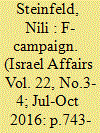| Srl | Item |
| 1 |
ID:
149195


|
|
|
|
|
| Summary/Abstract |
In the 2015 Israeli national elections, social media and especially Facebook were used as primary campaign platforms, where politicians of all parties and orientations expressed their agendas, made policy statements and communicated with potential voters. The present article employs a new methodology, discourse network analysis, to explore the relationships between party leaders and discourse themes, based on leaders’ pre-election statements on Facebook. The findings highlight prominent themes and the relationships formed between leaders and themes, and between leaders and each other. The network formed by party leaders’ shared agendas and themes resembles the parties’ positioning in the parliament after the election, strengthening the assumption that Facebook has been used strategically as a campaign tool by the leaders of parties running for parliament.
|
|
|
|
|
|
|
|
|
|
|
|
|
|
|
|
| 2 |
ID:
125742


|
|
|
|
|
| Publication |
2013.
|
| Summary/Abstract |
Today, biofuels represent one of the most common options for larger scale substitution of conventional fuels. Due to the trans-sectoral nature of biofuels, a multitude of factors and actors determine the according policies of governments and the beliefs of societies. Especially since some impacts of biomass cultivation for bioenergy production are not yet fully understood. This article aims at showing the drivers that led to an introduction of biofuel policies in Germany and explains Germany's pioneering role in the promotion of bioenergy. Thereby the focus lies on the role of the main actors and their composition of so called discourse coalitions. The analysis indicates that the origin of the biofuel industry was a result of national and supranational market interventions, as well as it was intermittently an instrument of supporting renewable energies. Along the seesaw of Germany's biofuel policies seven discourse coalitions were identified who compete for discursive hegemony in order to gain political influence.
|
|
|
|
|
|
|
|
|
|
|
|
|
|
|
|